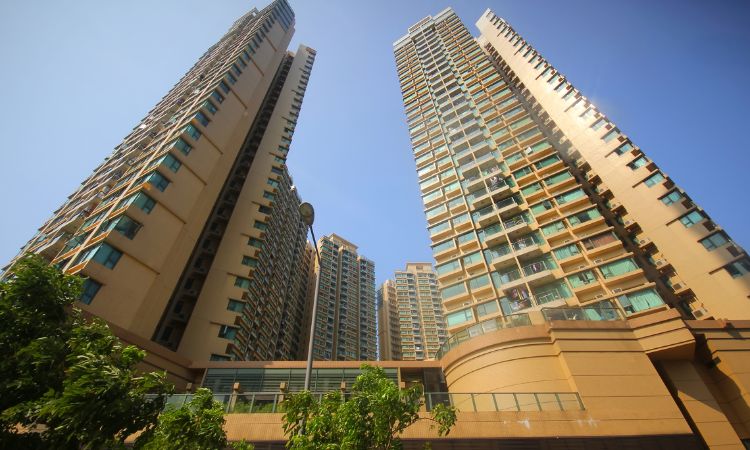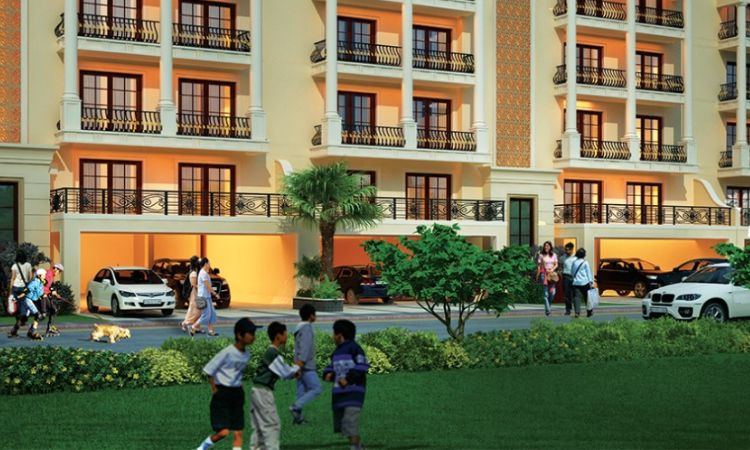Most individuals find it appealing to live in high-rise apartments in the center of a vibrant city, close to various facilities designed for all age groups. Is there a difference between a flat and an apartment, or are they merely terms used interchangeably? Continue reading to learn the definitions and history of these two words.
Table of Contents:
- What is a Flat?
- What is an Apartment?
- The Key Differences between Flat vs Apartment
- Advantages and Disadvantages Of Flats and Apartments in India
- What Should You Buy Flat or Apartments?
- Tips For Buying A Flat Or Apartments In India
- Conclusion
- FAQs
What is a Flat?
The term “flat” comes from the Old English word “flett,” which means dwelling/hall, and the Scottish word “flet,” which means a storey of a house. In British English, a “flat” is a set of rooms that make up a single dwelling, usually located on one level of a larger structure. These are commonly found in high-rise flats or a block of flats.

What is an Apartment?
An apartment is a self-contained dwelling unit within a multifamily residential structure. Typically, apartments are one-story buildings with many units inside a multifamily complex. The building itself may be classified as commercial property depending on its many units, while the individual units are residential real estate.
A single owner or management company usually handles the maintenance and upkeep of the common areas and the repairs of the individual units’ infrastructure. While apartments can be owned, as in co-ops or condominiums, they are typically associated with rental properties.

The Key Differences between Flat vs Apartment:
We may identify the minor distinctions between a flat and an apartment in Indiapartmentllow the customary definitions of each term. These are the main differences.
| Flat | Apartment |
|---|---|
| Flat is a word of British origin. | Apartment is a word of American origin. |
| It is often divided into a hallway, master bedroom, other bedrooms, restrooms, and a kitchen. | It has no set floor layout and can be any kind of home, including a duplex, townhouse, studio apartment, or regular apartment. |
| Possesses every essential living amenity. | May have more than the basic amenities. |
| Usually considered an average to premium living space. | Usually considered to be a premium living space. |
| Often referred to living units in smaller standalone buildings. | Often referred to living units in larger complexes with multiple buildings. |
| Tend to be more popular in well-known areas that have been developed for a long time. | Typically more common in regions with greater space outside of the city centre. |
| Flats are more expensive than an apartment. | Can be less expensive than a flat, especially if it is far away from the city centre. |
Advantages and Disadvantages Of Flats and Apartments in India:
Advantages of Flat
- A structure with apartments often has smaller living units, giving you more influence over construction-related decisions. For instance, if you purchase a property that is still under construction, you might be able to provide feedback on the standard of construction, the materials chosen, and the amenities the developers want to offer.
- Buildings with flats often have greater privacy and fewer requirements because there are fewer tenants. The parking regulations, pet ownership, and other obstacles that some tenants of apartment complexes may encounter are seldom problems for owners of flats.
- Flats owners typically reside in more centrally located buildings, which may facilitate commuting to employment and schools. It would also be great if there were more alternatives for shopping, healthcare, and entertainment.
Disadvantages of Flat
- Because there may only be one or two security guards to watch over the building, flats often have less secure entry.
- When there are fewer residents to pay for and monitor these services, cleanliness and upkeep might also become an issue.
- Due to space constraints, the facilities in flats may be restricted. Thus, you might not discover the amenities—like gaming rooms, gyms, sports courts and swimming pools—that you do in apartment buildings.
Advantages of Apartment
- If your housing society has a large number of buildings, you are likely to prefer living in an apartment block with a larger complex.
- Luxury apartment buildings typically provide a clubhouse, basketball court, badminton court, gym, football pitch and swimming pool among other facilities.
- Since many of the residential units in these high-rise structures are frequently located distant from the city’s central districts, where land values are higher, apartments are typically less expensive to buy.
- There is a greater chance of interacting with others and forming friendships because there are so many residents.
- Due to the large number of individuals who contribute and maintain records, apartment complexes often have greater security and upkeep than single-family homes.
Disadvantages of Apartment
- In an apartment complex, you do not have much of a voice in decisions because there are more dwelling units there, especially if you don’t agree with the majority. It is unlikely that discussions will take place regarding the quality of the building, the materials utilised, or the facilities the developers want to offer.
- Typically, apartment complexes have a higher number of construction regulations. Owners of apartments are frequently subject to strict rules on parking, guest parking, pet ownership, renovations, and other matters.
- Apartment owners typically reside in less centrally placed buildings, which may result in lengthy commutes to jobs and schools.

What Should You Buy Flat or Apartments?
Buying a flat or an apartment is a decision based on requirements and interests. Flats are usually one-story buildings, however apartments can have more than one story. To determine which choice is ideal for your unique situation, take into account elements such as lifestyle, location, and space needs.
Tips For Buying A Flat Or Apartments In India
- Make a budget and follow it. To make things go more smoothly, you must be aware of the budget you have in mind for your ideal house. You won’t be biting more than you can chew in the end. Therefore, this is the most crucial stage of the home-buying process.
- Make inquiries about the super built-up space, the carpet area, etc. need a thorough comprehension of these words.
- Ask the banks if your loan has been approved.
- Make a legal check and request the relevant documentation on approvals from the relevant authorities.
- Get all the necessary documentation about approvals from the relevant authorities and conduct a legal check.
- After paying the token fee, arrange with the builder.
Conclusion
When choosing to rent or purchase a house, no hard and fast rule says you have to pick one over the other. When looking for a place to live, the majority of individuals will look at flats and apartments.
Which area you want to live in, how affordable the rent or price of the home is, how many bedrooms and how big of a place you need, what amenities you want and which house you can finally picture yourself in will all play a major role in whether you decide to live in a flat or an apartment.
FAQs
1. Is an apartment and a flat the same?
A flat is a single residential unit on a single floor, whereas an apartment is where there are multiple residential units on a single floor.
2. What is a Flat house type?
In British English, a “flat” is a group of rooms that make up a single dwelling, usually located on one level of a larger structure. They are collectively referred to as a block of flats.
3. What is the difference between a condo and an apartment?
A condo is often on one floor while an apartment could have multiple storeys.
4. What should I choose between a flat and an apartment
A flat is better for more privacy and control over the residence’s construction. On the other hand, if you want more security, more conveniences, and more neighbours, an apartment is better.
5. What is the difference between a flat and a condo?
Flat and condo are the same thing – a set of rooms that is on one floor.


